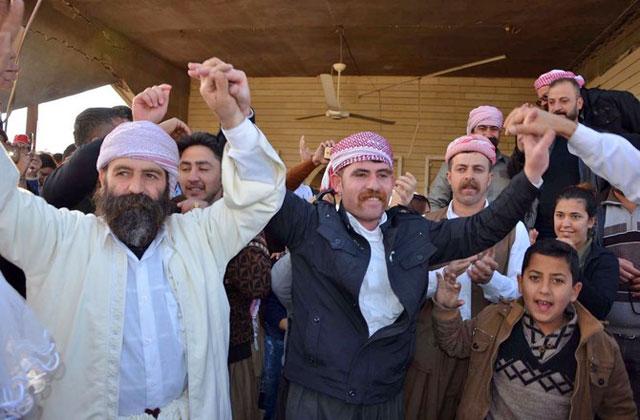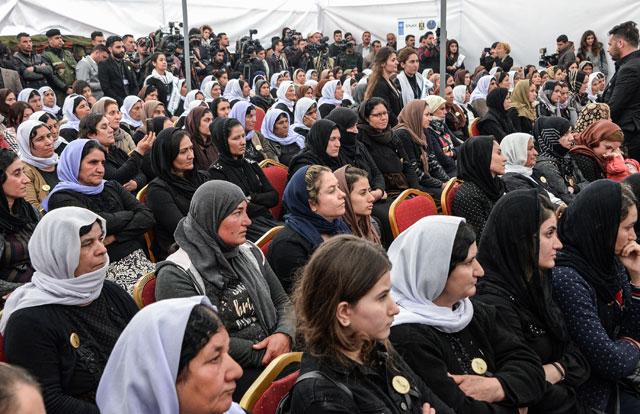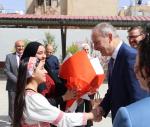You are here
Yazidi minority faces persecution from extremists
By AFP - Dec 10,2018 - Last updated at Dec 10,2018

Iraqi Yazidis visit their temple during a ceremony in the town of Bashiqa, some 20 kilometres north east of Mosul, on January 12 (AFP photo)
BAGHDAD — The Daesh group especially targeted the Yazidi minority when it seized control of large parts of Iraq in 2014, massacring its men and forcing women into sexual slavery.
2018 Nobel Peace Prize winner Nadia Murad, among the victims, was captured, raped and forced to marry a terrorist before she was able to escape.
As Murad received the award on Monday in Oslo with Congolese doctor Denis Mukwege, here is some background about her Yazidi community for whom she has become a powerful advocate.
Ancient faith
Of the world’s 1.5 million Yazidis, the largest number was in Iraq where it comprised some 550,000 people before being scattered by the Daesh offensive in 2014.
Mainly living in remote corners of the north of the country, the Kurdish-speaking Yazidis are followers of an ancient and unique religion.
Their faith emerged in Iran more than 4,000 years ago and is rooted in Zoroastrianism, over time integrating elements of Islam and Christianity.
With no holy book and organised into castes, Yazidis pray to God facing the sun and worship his seven angels — first and foremost Melek Taus, or Peacock Angel.
Yazidis discourage marriage outside of their community and even across their caste system.
Their usual beliefs and practices, such as a ban on eating lettuce and wearing the colour blue, have often been seen by other Iraqis as satanic.
Orthodox Muslims consider the peacock a demon figure and refer to Yazidis as devil-worshippers.
Long persecuted
Being non-Arab and non-Muslim has placed Yazidis among Iraq’s most vulnerable minorities.
Persecution by Saddam Hussein, president between 1979 and 2003, forced thousands of families to flee the country. Germany is home to the largest community abroad.
The Iraqi constitution of 2005 recognised the Yazidi right to practise their religion and gave them seats in the central and autonomous Kurdish parliaments.
But for extremists, with their ultra-strict interpretation of Islam, they are heretics.
In an attack blamed on Al Qaeda, massive truck bombs almost entirely destroyed two small Yazidi villages in northern Iraq on August 14, 2007. More than 400 people died.
The community also came under assault by the Daesh group when it launched a sweeping offensive in 2014 to seize nearly a third of Iraq, before being beaten back and defeated three years later.
Daesh victims
The Daesh seized the Yazidi bastion of Sinjar, near the border with Syria, in August 2014, unleashing a brutal campaign against the minority that drew warnings of a potential genocide.
Thousands of men were slaughtered and thousands of women and girls abducted as sex slaves, while boys were sent to military training camps to become soldiers.
According to the religious affairs ministry of Iraq’s autonomous Kurdish region, the Daesh abducted more than 6,400 Yazidis.
Kurdish Iraqi officials said in December 2017 that around half of those kidnapped were still missing and that 47 mass graves containing the remains of Yazidis had been found since 2014.
The Daesh assault also led about 100,000 Yazidis to flee Iraq, with about 360,000 more displaced.
UN investigates
In March 2015, UN investigators said the Daesh assault on the Yazidis was a premeditated effort to exterminate an entire community — crimes that amount to genocide.
In September 2017, the UN Security Council set up an investigation team. Britain drafted the resolution to help bring perpetrators of Daesh war crimes to justice — a cause championed by international human rights lawyer Amal Clooney.
The investigation team announced in December 2018 that it would begin work early next year to gather evidence on war crimes, crimes against humanity or genocide for use in Iraqi courts that will hold trials for Daesh militants.
Related Articles
BASHIQA, Iraq — Northern Iraq's Yazidi community that suffered so terribly under the Daesh terror group persecution celebrated on Friday as
AKNALICH, Armenia — Yazidis, an ancient ethnic group much persecuted for their faith, now have a massive new temple in Armenia to help prese
KOJO, Iraq — Iraqi authorities on Friday opened a first mass grave containing victims of the Daesh group in the Yazidi stronghold of Si


















